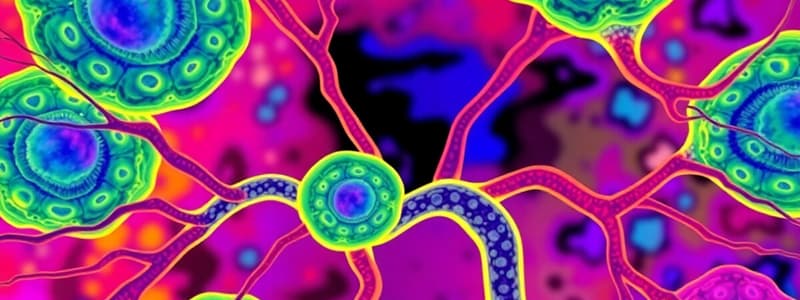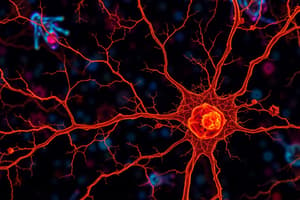Podcast
Questions and Answers
What is the primary function of the neurons in the cerebral cortex?
What is the primary function of the neurons in the cerebral cortex?
- Production of cerebrospinal fluid
- Formation of the central canal
- Integration of sensory information and initiation of voluntary motor responses (correct)
- Coordination of muscular activity
Which layer of the cerebellar cortex contains the large Purkinje cells?
Which layer of the cerebellar cortex contains the large Purkinje cells?
- Molecular layer
- Purkinje cell layer
- Granule layer
- Central layer (correct)
What shape does the gray matter of the spinal cord generally resemble?
What shape does the gray matter of the spinal cord generally resemble?
- A square
- A circle
- An H (correct)
- A butterfly
What is contained within the central canal of the spinal cord?
What is contained within the central canal of the spinal cord?
What type of neuron is primarily found in the anterior horns of the gray matter in the spinal cord?
What type of neuron is primarily found in the anterior horns of the gray matter in the spinal cord?
What are fibrous astrocytes primarily characterized by?
What are fibrous astrocytes primarily characterized by?
What unique marker is associated with astrocytes?
What unique marker is associated with astrocytes?
What is a primary function of protoplasmic astrocytes?
What is a primary function of protoplasmic astrocytes?
Ependymal cells do NOT have which of the following characteristics?
Ependymal cells do NOT have which of the following characteristics?
Which cells are primarily responsible for scanning the CNS for damage and pathogens?
Which cells are primarily responsible for scanning the CNS for damage and pathogens?
How do astrocytes primarily communicate with one another?
How do astrocytes primarily communicate with one another?
What structure is formed by the expanded processes of astrocytes that lines the external CNS surface?
What structure is formed by the expanded processes of astrocytes that lines the external CNS surface?
In which area are fibrous astrocytes predominantly found?
In which area are fibrous astrocytes predominantly found?
Which type of glial cell is primarily involved in immune defense in the CNS?
Which type of glial cell is primarily involved in immune defense in the CNS?
What is a key difference between Schwann cells and oligodendrocytes?
What is a key difference between Schwann cells and oligodendrocytes?
What are the main components of white matter in the CNS?
What are the main components of white matter in the CNS?
Which statement is true regarding satellite cells in ganglia?
Which statement is true regarding satellite cells in ganglia?
What primarily distinguishes gray matter from white matter in the CNS?
What primarily distinguishes gray matter from white matter in the CNS?
Where is most of the gray matter located in the CNS?
Where is most of the gray matter located in the CNS?
What type of connective tissue covers the CNS?
What type of connective tissue covers the CNS?
What are nuclei in the context of the CNS?
What are nuclei in the context of the CNS?
What is the primary function of oligodendrocytes in the CNS?
What is the primary function of oligodendrocytes in the CNS?
How do glial cells contribute to neuronal activity?
How do glial cells contribute to neuronal activity?
What is the primary difference between the processes of oligodendrocytes and other glial cells?
What is the primary difference between the processes of oligodendrocytes and other glial cells?
What condition is characterized by damage to myelin sheaths in the CNS?
What condition is characterized by damage to myelin sheaths in the CNS?
Which statement about astrocytes is true?
Which statement about astrocytes is true?
What role do T lymphocytes and microglia play in Multiple Sclerosis?
What role do T lymphocytes and microglia play in Multiple Sclerosis?
Which type of glial cell is primarily associated with the lipid-rich white matter of the CNS?
Which type of glial cell is primarily associated with the lipid-rich white matter of the CNS?
What is the characteristic composition of the spaces surrounding neurons in the CNS?
What is the characteristic composition of the spaces surrounding neurons in the CNS?
Flashcards
Glial cells
Glial cells
Specialized cells in the central nervous system (CNS) that support and protect neurons.
Oligodendrocytes
Oligodendrocytes
Glial cells responsible for producing myelin sheaths, which insulate axons in the CNS.
Multiple Sclerosis (MS)
Multiple Sclerosis (MS)
A degenerative disease that affects the myelin sheaths of neurons, leading to neurological problems.
Astrocytes
Astrocytes
Signup and view all the flashcards
Neuropil
Neuropil
Signup and view all the flashcards
White matter
White matter
Signup and view all the flashcards
Gray matter
Gray matter
Signup and view all the flashcards
Fibrous network in the CNS
Fibrous network in the CNS
Signup and view all the flashcards
Fibrous astrocytes
Fibrous astrocytes
Signup and view all the flashcards
Protoplasmic astrocytes
Protoplasmic astrocytes
Signup and view all the flashcards
Glial fibrillary acidic protein (GFAP)
Glial fibrillary acidic protein (GFAP)
Signup and view all the flashcards
Perivascular feet
Perivascular feet
Signup and view all the flashcards
Glial limiting membrane
Glial limiting membrane
Signup and view all the flashcards
Ependymal cells
Ependymal cells
Signup and view all the flashcards
Microglia
Microglia
Signup and view all the flashcards
Schwann cell function
Schwann cell function
Signup and view all the flashcards
Satellite cells of ganglia
Satellite cells of ganglia
Signup and view all the flashcards
Central nervous system (CNS)
Central nervous system (CNS)
Signup and view all the flashcards
Meninges
Meninges
Signup and view all the flashcards
Nuclei in the CNS
Nuclei in the CNS
Signup and view all the flashcards
Motor neurons in the anterior horns
Motor neurons in the anterior horns
Signup and view all the flashcards
Central canal of the spinal cord
Central canal of the spinal cord
Signup and view all the flashcards
Purkinje cell layer
Purkinje cell layer
Signup and view all the flashcards
Molecular layer of the cerebellar cortex
Molecular layer of the cerebellar cortex
Signup and view all the flashcards
Granule layer of the cerebellar cortex
Granule layer of the cerebellar cortex
Signup and view all the flashcards
Study Notes
Glial Cells & Neuronal Activity
- Glial cells support neuronal survival and function, significantly more abundant in the mammalian brain than neurons.
- Glial cells originate from progenitor cells in the embryonic neural plate.
- Glial cells surround neuronal cell bodies, axons, and dendrites, filling spaces between neurons.
- The CNS has minimal connective tissue, with glial cells playing a connective tissue-like role.
- Glial cells create a specialized microenvironment surrounding neurons for optimal activity.
- The intercellular network surrounding CNS cells resembles collagen but is a network of cellular processes (neuropil).
Types of Glial Cells
-
Oligodendrocytes:
- Small cells that produce myelin sheaths around axons in the CNS.
- Their sheet-like processes wrap around parts of several axons, forming myelin sheaths.
- Predominate in the white matter of the CNS due to the lipid concentration in the myelin sheaths.
- Crucial for electrical insulation of neurons.
- Damage in multiple sclerosis (MS) affects oligodendrocyte function, exacerbating the disease.
-
Astrocytes:
- Abundant, star-shaped glial cells with radiating processes.
- Two types: fibrous (white matter) and protoplasmic (gray matter).
- Extensive processes associate with numerous synaptic sites.
- Contain glial fibrillary acidic protein (GFAP), a marker for astrocytes (commonly associated with brain tumors).
- Functions include:
- Forming the blood-brain barrier (BBB) by associating with blood vessels.
- Supporting synapses, affecting their formation, function, and plasticity.
- Forming the glial limiting membrane, a barrier layer surrounding the CNS.
- Allow for communication between astrocytes through gap junctions.
-
Ependymal Cells:
- Columnar or cuboidal cells lining ventricles and central canal of the CNS.
- Some have cilia that facilitate cerebrospinal fluid (CSF) movement.
- Involved in CSF absorption.
-
Microglia:
- Small, macrophage cells with irregular processes.
- Distributed throughout gray and white matter.
- Migrate through the neuropil, scanning for damaged cells and pathogens.
- Secrete immunoregulatory cytokines.
- Primary immune defense mechanism in the CNS, similar to other antigen-presenting cells.
-
Schwann Cells:
- Found only in the peripheral nervous system (PNS).
- Differentiate from neural crest precursors,
- Myelinate axons in the PNS, one Schwann cell per segment of axon, in contrast to oligodendrocytes which can myelinate parts of several axons.
-
Satellite Cells:
- Surround neuronal cell bodies in ganglia of the PNS.
- Derived from the embryonic neural crest.
- Form an intimate covering layer over neuronal cell bodies.
- May exert trophic or supportive effects on neurons.
Central Nervous System (CNS)
- Composed of cerebrum, cerebellum, and spinal cord.
- Protected by meninges (three connective tissue layers).
- Consists of white matter (primarily myelinated axons) and gray matter (neuronal cell bodies, dendrites).
- White matter tracts contain myelinated axons and myelin-producing oligodendrocytes.
- Gray matter contains abundant neuronal cell bodies, dendrites, and unmyelinated axons.
- Gray matter typically occupies the surface (cortex) of the cerebrum and cerebellum, and deeper regions may have nuclei.
- Cerebral cortex contains neurons organized in layers, including Purkinje cells in the cerebellum.
- The spinal cord has a central canal lined by ependymal cells, with gray matter in the shape of an "H" and white matter surrounding it. Gray matter houses motor neurons in anterior horns and sensory neuron cell bodies in the posterior horns.
Studying That Suits You
Use AI to generate personalized quizzes and flashcards to suit your learning preferences.




